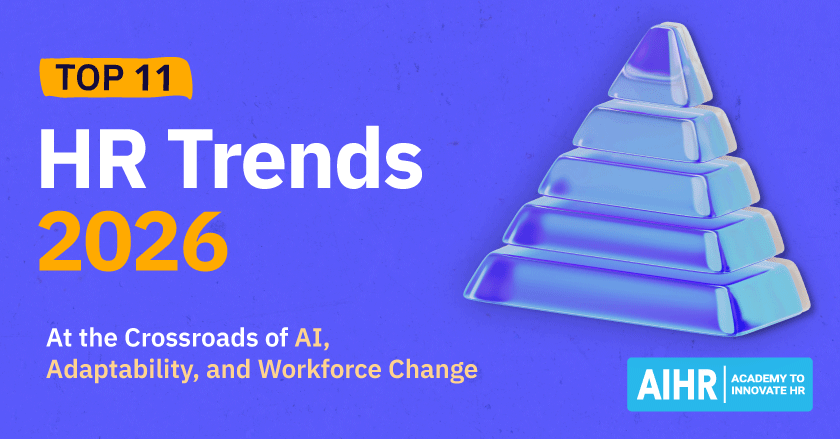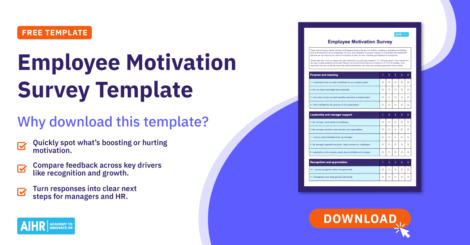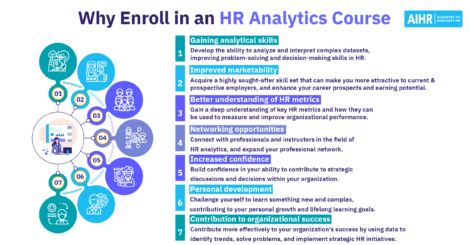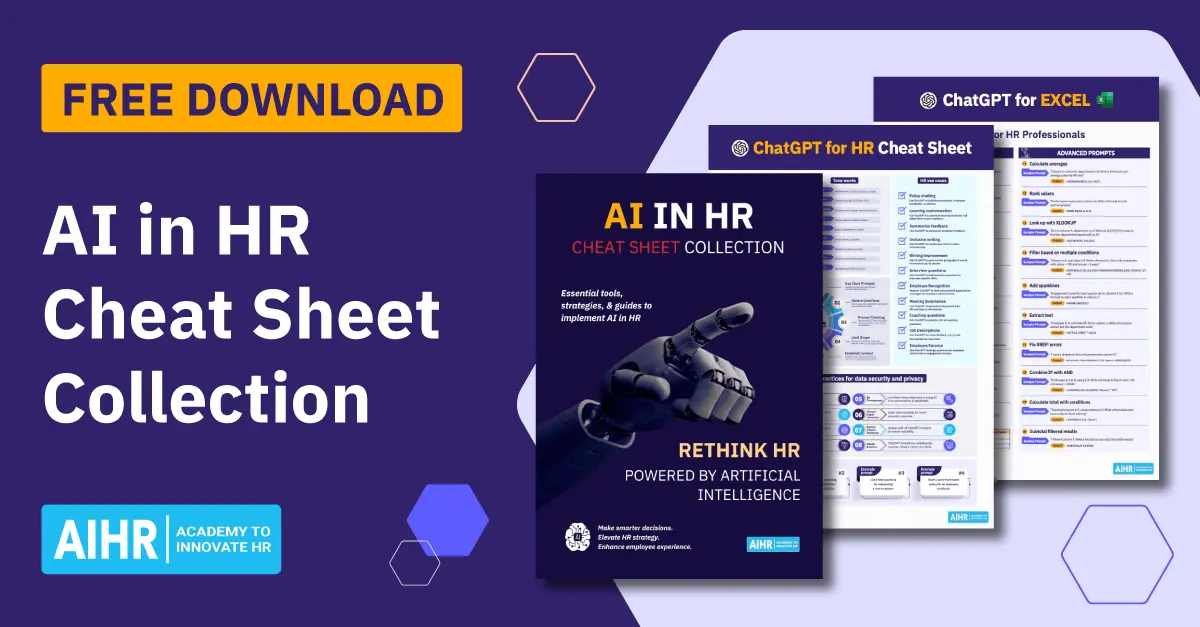The HR Data Administrator is responsible for the documentation, organization, and retrieval of data from the HR system. They provide support to other HR colleagues, business managers, and other key stakeholders to maintain the smooth functioning of organizational processes.
Contents
Role family & work experience
Key responsibilities
Skills & competencies
Job description template
Detailed responsibilities & tasks
KPIs for this role
Training programs
Role family, salary range & work experience
- HR role family: Service champion
- Salary range: 50,000 – 62,000
- Work experience: Minimum 1 year
Key responsibilities
- Data collection, management and analysis of employee data.
- Enables the accurate processing and storage of various HR data by maintaining an electronic filing system with appropriate naming and categorization of electronic documents.
- Accurate and timely HR reporting through the utilization of HR systems and technologies.
- Maintenance and support for HR systems, such as the HRIS.
Skills & competencies
- Analytics Translation
- Data-Driven
- Digital Aptitude
- Technology Empowered
Job description template: HR Data Administrator
The role of an HR Data Administrator in HR management is to manage the organization’s HR data and support HR decision-making. This involves collecting, organizing, and maintaining HR data, ensuring its accuracy and completeness, and analyzing it to identify trends and insights that inform HR strategies and policies.
Responsibilities:
- Collect, organize, and maintain HR data in the HRIS, including personal information, employment history, performance metrics, and other relevant data.
- Ensure the accuracy, completeness, and consistency of HR data.
- Analyze HR data to identify trends and insights that inform HR decision-making.
- Create and distribute HR reports to senior management and other stakeholders.
- Ensure HR data is compliant with legal and regulatory requirements, including data privacy laws.
- Maintain the HRIS and ensure it is up-to-date with the latest data.
- Provide training and support to HR staff who use the HRIS.
- Troubleshoot technical issues related to HRIS and other software tools.
- Collaborate with HR managers to develop data-driven strategies that improve the performance and wellbeing of the organization’s workforce.
- Identify areas of improvement in HR data management and analysis processes and implement solutions.
Requirements:
- Bachelor’s degree in HR, data management, or a related field.
- 2+ years of experience in HR data management and analysis.
- Strong technical skills, including proficiency in HRIS, SQL, Excel, and other database management tools.
- Analytical skills, with the ability to extract insights and trends from HR data.
- Communication skills, with the ability to present complex data and technical information in a clear and concise manner.
- Attention to detail, with the ability to maintain data integrity and accuracy.
- Compliance knowledge, with an understanding of legal and regulatory requirements related to HR data privacy and security.
- Problem-solving skills, with the ability to identify and resolve issues related to data management and analysis.
Detailed responsibilities & tasks
- Data collection: One of the primary responsibilities of a Data Administrator in HR is to collect and maintain employee data, including personal information, employment history, performance metrics, and other relevant data.
- Data management: Data Administrators are responsible for ensuring the accuracy, completeness, and consistency of HR data. They also ensure data is secured and protected from unauthorized access.
- Data analysis: Data Administrators use analytical tools to extract insights and trends from HR data. They use this information to identify areas of improvement, forecast future workforce needs, and make data-driven decisions.
- Reporting: Data Administrators create and distribute HR reports to senior management and other stakeholders. These reports may include employee turnover rates, performance metrics, and other HR-related data.
- Compliance: Data Administrators ensure HR data is compliant with legal and regulatory requirements. They ensure data privacy laws are followed and that employee data is handled in accordance with company policies.
- System maintenance: Data Administrators maintain the HR information system (HRIS) used to store and manage HR data. They ensure the HRIS is updated with the latest data and that the system is working correctly.
- Training and support: Data Administrators provide training and support to HR staff who use the HRIS. They also provide technical support to resolve issues related to data entry, system performance, and data security.
Detailed skills description
- Data management: The ability to collect, organize, and maintain HR data accurately and securely is a crucial skill for an HR Data Administrator. This includes understanding data models, database management systems, data analysis, and data visualization.
- Technical skills: HR Data Administrators need to be proficient in using HRIS and other related software tools. They should have a working knowledge of SQL, Excel, and other database management tools.
- Analytical skills: HR Data Administrators should be able to analyze data and extract insights that inform HR decision-making. They need to be able to use data to identify trends, predict future outcomes, and make data-driven recommendations.
- Communication skills: HR Data Administrators need to be able to communicate complex data and technical information in a clear and concise manner. They should be able to present data and insights to stakeholders at all levels of the organization.
- Attention to detail: HR Data Administrators need to be detail-oriented and have a high degree of accuracy in their work. They should be able to identify and correct errors in data and maintain data integrity.
- Compliance knowledge: HR Data Administrators should be knowledgeable about legal and regulatory requirements related to HR data privacy and security. They need to be able to ensure HR data is collected, managed, and stored in compliance with these requirements.
- Problem-solving: HR Data Administrators should be able to identify and resolve issues related to data management and analysis. They should be able to troubleshoot technical issues related to HRIS and other software tools.
KPIs for this role
- Data accuracy: This KPI measures the percentage of HR data that is accurate and up-to-date. It can be calculated by comparing the number of errors in the HR data to the total number of records.
- Data completeness: This KPI measures the percentage of HR data that is complete and includes all the required fields. It can be calculated by comparing the number of incomplete records to the total number of records.
- Data security: This KPI measures the effectiveness of the data administrator in ensuring that HR data is protected from unauthorized access. It can be measured by tracking the number of security breaches or data leaks.
- Data timeliness: This KPI measures the speed at which HR data is collected, entered, and updated in the HRIS. It can be calculated by measuring the average time taken to complete data entry tasks.
- Report turnaround time: This KPI measures the time taken by the Data Administrator to create and distribute HR reports. It can be measured by tracking the time taken to generate reports and the frequency of reporting.
- User satisfaction: This KPI measures the satisfaction level of HR staff who use the HRIS. It can be measured by conducting surveys or feedback sessions to gather user feedback.
- Compliance: This KPI measures the extent to which HR data is compliant with legal and regulatory requirements. It can be measured by tracking the number of compliance violations and the steps taken to address them.
Training programs
- Compensation & Benefits Certificate Program
- HR Generalist Certificate Program
- HR Metrics & Dashboarding Certificate Program
















